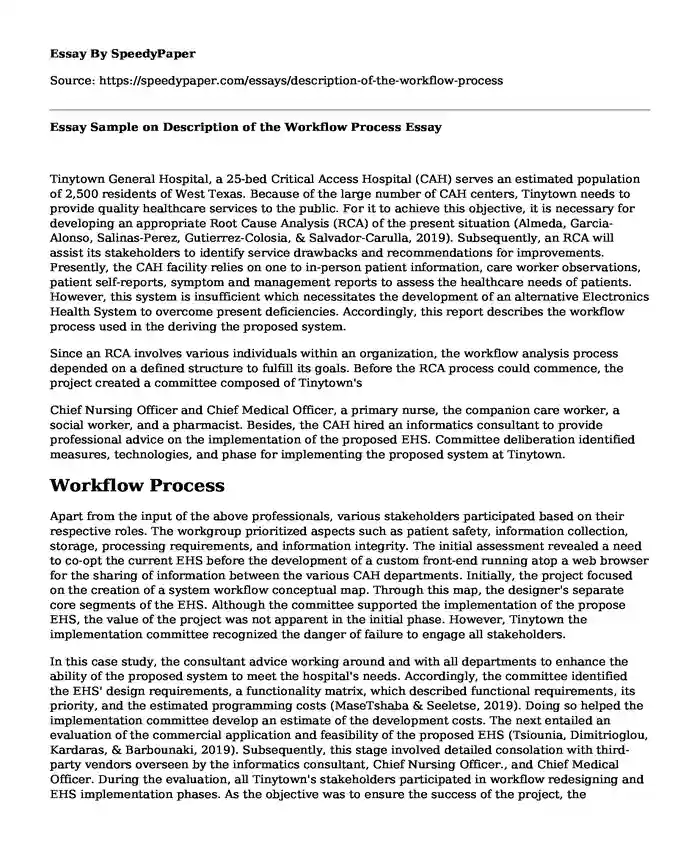
| Type of paper: | Course work |
| Categories: | Medicine Human services |
| Pages: | 3 |
| Wordcount: | 660 words |
Tinytown General Hospital, a 25-bed Critical Access Hospital (CAH) serves an estimated population of 2,500 residents of West Texas. Because of the large number of CAH centers, Tinytown needs to provide quality healthcare services to the public. For it to achieve this objective, it is necessary for developing an appropriate Root Cause Analysis (RCA) of the present situation (Almeda, Garcia-Alonso, Salinas-Perez, Gutierrez-Colosia, & Salvador-Carulla, 2019). Subsequently, an RCA will assist its stakeholders to identify service drawbacks and recommendations for improvements. Presently, the CAH facility relies on one to in-person patient information, care worker observations, patient self-reports, symptom and management reports to assess the healthcare needs of patients. However, this system is insufficient which necessitates the development of an alternative Electronics Health System to overcome present deficiencies. Accordingly, this report describes the workflow process used in the deriving the proposed system.
Since an RCA involves various individuals within an organization, the workflow analysis process depended on a defined structure to fulfill its goals. Before the RCA process could commence, the project created a committee composed of Tinytown's
Chief Nursing Officer and Chief Medical Officer, a primary nurse, the companion care worker, a social worker, and a pharmacist. Besides, the CAH hired an informatics consultant to provide professional advice on the implementation of the proposed EHS. Committee deliberation identified measures, technologies, and phase for implementing the proposed system at Tinytown.
Workflow Process
Apart from the input of the above professionals, various stakeholders participated based on their respective roles. The workgroup prioritized aspects such as patient safety, information collection, storage, processing requirements, and information integrity. The initial assessment revealed a need to co-opt the current EHS before the development of a custom front-end running atop a web browser for the sharing of information between the various CAH departments. Initially, the project focused on the creation of a system workflow conceptual map. Through this map, the designer's separate core segments of the EHS. Although the committee supported the implementation of the propose EHS, the value of the project was not apparent in the initial phase. However, Tinytown the implementation committee recognized the danger of failure to engage all stakeholders.
In this case study, the consultant advice working around and with all departments to enhance the ability of the proposed system to meet the hospital's needs. Accordingly, the committee identified the EHS' design requirements, a functionality matrix, which described functional requirements, its priority, and the estimated programming costs (MaseTshaba & Seeletse, 2019). Doing so helped the implementation committee develop an estimate of the development costs. The next entailed an evaluation of the commercial application and feasibility of the proposed EHS (Tsiounia, Dimitrioglou, Kardaras, & Barbounaki, 2019). Subsequently, this stage involved detailed consolation with third-party vendors overseen by the informatics consultant, Chief Nursing Officer., and Chief Medical Officer. During the evaluation, all Tinytown's stakeholders participated in workflow redesigning and EHS implementation phases. As the objective was to ensure the success of the project, the implementation committee collected observation from the different players and used it to design the new processes. As a result, the workflow redesign process benefitted forms the inputs of personnel closer to the redesign. Over the lifecycle of the project, the various stakeholders provide useful insights for over 100 procedures for the restructuring of the identified workflow. Table 1 below depicts the EHS implementation process. However, the implementation of the redesigned workflow occurred in phases as recommended by the informatics consultant.
References
Almeda, N., Garcia-Alonso, C. R., Salinas-Perez, J. A., Gutierrez-Colosia, M. R., & Salvador-Carulla, L. (2019). Causal Modelling for Supporting Planning and Management of Mental Health Services and Systems: A Systematic Review. International Journal of Environmental Research and Public Health, 16(3), 332.
M. T., & Seeletse, S. M. (2019). Modelling and measuring milestones in business process optimization. Management, 12, 4-1.
Tsiounia, K., Dimitrioglou, N. G., Kardaras, D., & Barbounaki, S. G. (2019). A Process Modelling and Analytic Hierarchy Process Approach to Investigate the Potential of the IoT in Health Services. In World Congress on Medical Physics and Biomedical Engineering 2018 (pp. 381-386). Springer, Singapore.
Cite this page
Essay Sample on Description of the Workflow Process. (2022, Nov 09). Retrieved from https://speedypaper.com/essays/description-of-the-workflow-process
Request Removal
If you are the original author of this essay and no longer wish to have it published on the SpeedyPaper website, please click below to request its removal:
- Free Essay on Crime Scene Investigation Procedures
- Free Essay: Ping Chong Awareness Dispute Racial Problem in America
- Free Essay on the Importance of Writing in Nursing
- Free Paper Sample on Balancing Economic Growth with Environmental Protection
- Essay Example on Effects of Falling Value of Euro
- Essay Example on Issues in Society Arose Due the Internet and Social Media
- Free Paper- Cognitive Dissonance
Popular categories




